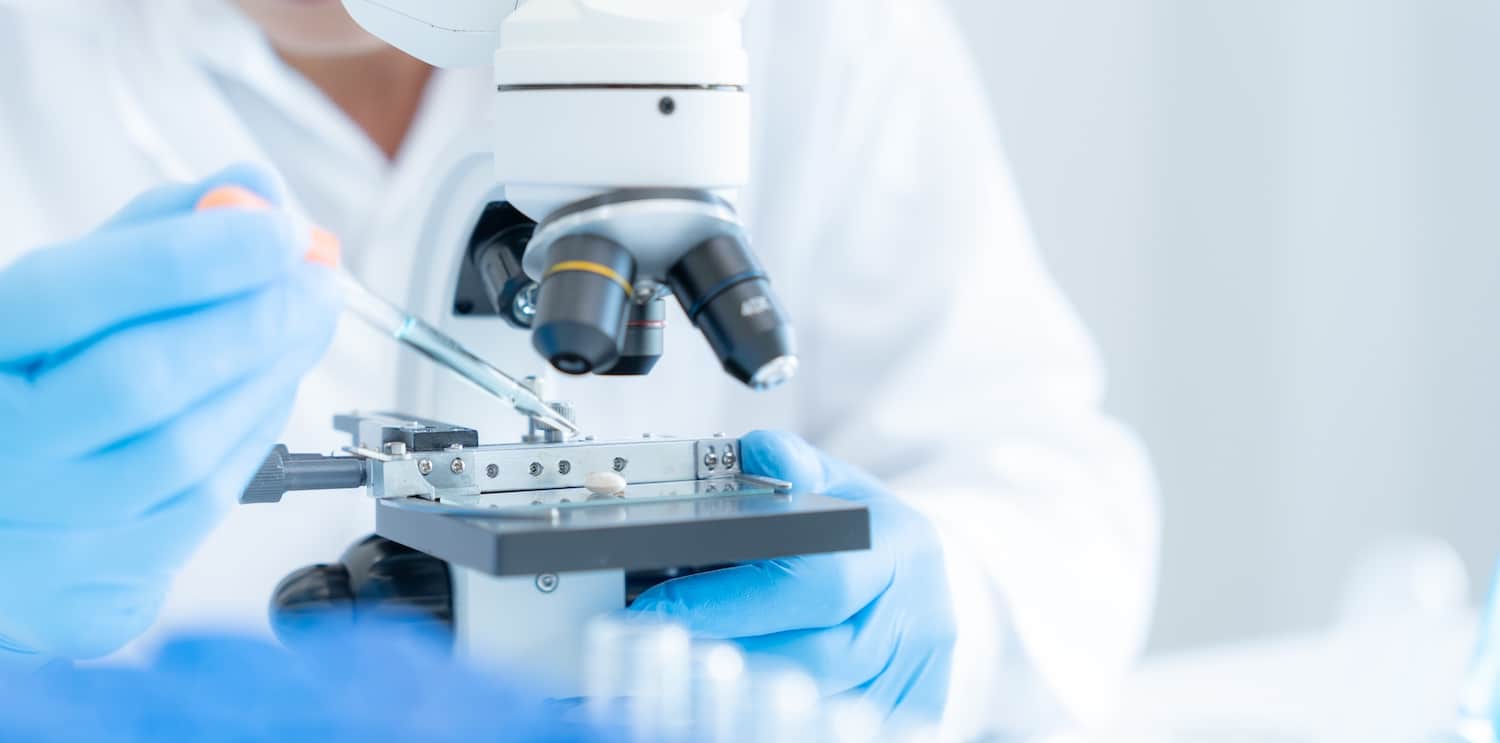Where Does Genetic Testing Fit Into the Breast Cancer Diagnosis Timeline?

Breast cancer is the second most common type of cancer in women in the United States, affecting 1 in 8, according to the American Cancer Society. While the majority of breast cancers are sporadic, about 5-10% are hereditary, linked to specific genetic changes passed down through families.
For those diagnosed with breast cancer, understanding the genetic makeup of their cancer is crucial for determining the most effective treatment plan. This is where genetic testing, specifically somatic and germline whole genome sequencing (WGS), plays a vital role. CancerVision offers paired WGS cancer profiling, providing comprehensive insights into the genetic alterations driving each unique cancer case, whether it’s an early or more advanced breast cancer stage.
Understanding the Breast Cancer Diagnosis Timeline
Breast cancer can develop without noticeable symptoms, and early-stage tumors like stage 0 breast cancer can be challenging to detect. Sometimes, inflammatory breast cancer can be mistaken for other conditions, such as infections, due to overlapping symptoms. This means you could have breast cancer for years without knowing it, delaying initial diagnosis and treatment.
However, once breast cancer is suspected—whether through the discovery of a breast lump, symptoms, or abnormal screening results—determination of breast cancer stages usually occurs within days to weeks. This timeline can include a variety of tests, such as mammograms, breast tissue biopsies, MRIs, or ultrasounds, to confirm the presence of cancer.
The Role of Genetic Testing in Breast Cancer Diagnosis
While traditional diagnostic tools like biopsies and imaging are essential for confirming breast cancer, genetic testing offers deeper insights into the nature of the cancer. However, it’s important to differentiate between cancer risk screening and genetic profiling for diagnosed cancers.
CancerVision is not a cancer risk screening tool; it is designed for individuals who have already been diagnosed with breast cancer, including invasive and metastatic breast cancer, and need detailed genetic profiling. By analyzing both somatic (tumor-specific) and germline (inherited) mutations, CancerVision provides a comprehensive picture of the genetic landscape of your cancer, which is crucial for personalized treatment planning.
Gene Variants That May Increase Your Breast Cancer Risk
Changes in certain genes can put you at higher risk for breast cancer. A few genes that can impact your breast cancer risk include:
- CHEK2: The CHEK2 gene acts as a tumor suppressor. When working properly, it creates a protein that helps repair damaged DNA before it is replicated during the cell cycle. A change to the CHEK2 gene affects its ability to function properly, increasing your risk of certain cancers, including breast cancer. CHEK2 is associated with moderate breast cancer risk, with a lifetime risk of 20% to 40%.
- BRCA1 and BRCA2: These genes are most commonly linked to breast cancer. They help repair damaged cells, specifically regulating breast cancer cells. If you inherit a variant of either BRCA gene, which means it is not functioning like it should, you may have a lifetime risk of 45% to 85% for developing breast cancer.
- PALB2: This gene works alongside BRCA2 to stop breast tumor growth. Women with a variant of the PALB2 gene have a higher likelihood of developing breast cancer, with research estimating this risk to be around 14% for women 50 and younger. The risk increases to 35% by age 70, especially with a family history of breast cancer.
- TP53: This gene halts the growth of cells with DNA damage. When it’s not working, abnormal cells can grow and divide without being properly regulated, which could cause cancer. Inheriting a change in the TP53 gene increases the risk of Li-Fraumeni syndrome, a rare disease associated with multiple cancers, including breast cancer.
- ATM: The ATM gene can fix damaged DNA or trigger cell death if the DNA cannot be repaired. Variants of this gene are linked to an increased risk of early-onset breast cancer, with studies suggesting a lifetime breast cancer risk of 20% to 30%.
- CDH1: Changes to the CDH1 gene are linked to hereditary diffuse gastric cancer and might also increase the risk of developing lobular breast cancer. Women with CDH1 gene variants are estimated to have a lifetime lobular breast cancer risk of 42%.
- PTEN: The PTEN gene controls cell division to prevent abnormal growth. Variants in PTEN can cause Cowden syndrome, which leads to benign growths in various parts of the body and is also associated with an elevated breast cancer risk.
Having a variant of one or more of these genes does not mean you will develop breast cancer. However, it is important to be aware of your breast cancer risk so you and your healthcare provider can make informed decisions for your health. A genetic counselor can help you interpret your results in a way that makes it easy to understand your individual cancer risk.
Somatic vs. Germline Mutations: Why Both Matter
Somatic mutations occur in the DNA of individual cells during a person’s lifetime and are not inherited. In the context of cancer, these mutations are specific to the tumor and can provide critical insights into the cancer’s behavior, including its growth patterns, how it might respond to different treatments, and which therapies may be most effective.
Germline mutations, on the other hand, are inherited genetic changes present in every cell of the body. Understanding germline mutations is vital not only for assessing potential hereditary cancer risks but also for tailoring treatment strategies based on inherited genetic factors.
CancerVision’s paired WGS approach means it simultaneously analyzes both somatic and germline mutations, offering a dual perspective that enhances the precision of your treatment plan.
How Genetic Profiling Fits into the Treatment Timeline
After a breast cancer diagnosis is confirmed, the next step is often to gather as much information as possible to guide treatment decisions. This is where CancerVision’s genetic profiling comes in.
- Early in the Diagnosis Process: CancerVision can be used early in the diagnosis process to analyze the tumor’s genetic profile, helping your healthcare team understand the specific mutations driving your cancer. This can inform decisions about which treatments are likely to be most effective, such as targeted therapies or immunotherapies.
- During Treatment Planning: The insights gained from CancerVision’s genome testing for cancer can influence the choice of breast cancer surgery, chemotherapy, radiation, or hormone therapies. For example, if your tumor has specific somatic mutations that are known to respond well to certain drugs, your treatment plan can be tailored accordingly.
- Ongoing Monitoring and Adjustments: Genetic profiling isn’t just a one-time tool; it can be used throughout your treatment journey. As new therapies become available, or if your cancer returns, updated genetic profiling can help adjust your treatment plan to reflect the latest options and research.
The Benefits of Comprehensive Genetic Profiling with CancerVision
- Personalized Treatment: CancerVision’s dual analysis of somatic and germline mutations enables a personalized approach to breast cancer treatment. By understanding the specific genetic drivers of your cancer, your healthcare team can choose treatments that are tailored to those mutations.
- Expanded Treatment Options: Some therapies are only effective for cancers with certain genetic profiles. By identifying both somatic and germline mutations, CancerVision can help open the door to more treatment options to treat breast cancer, including experimental therapies and clinical trials.
- Informed Family Risk Management: While CancerVision is not a risk screening tool, the germline component of its analysis can still provide valuable information for your family. If inherited mutations are identified, your relatives may benefit from their own genetic testing to assess their cancer risks.
Uncover the Full Picture of Your Breast Cancer with CancerVision
Detecting breast cancer early and understanding its genetic makeup are among the key factors to successful treatment. While routine screenings like mammograms are crucial for early detection, once diagnosed, genetic profiling with CancerVision can provide the detailed insights that can be invaluable in guiding your treatment journey.
CancerVision is here to help you and your healthcare team make informed decisions based on the most comprehensive genetic information available. Talk to your doctor about how CancerVision’s somatic and germline whole genome sequencing test can support your breast cancer treatment plan.
Get the insights you need to take control of your breast cancer treatment. Order your CancerVision test today.
References
- 6 Questions Answered about the CDH1 Gene Mutation & Stomach Cancer. (2024, July 23). Memorial Sloan Kettering Cancer Center. https://www.mskcc.org/news/6-things-know-about-cdh1-gene-mutation-and-stomach
- Breast cancer risk factors you can’t change. (n.d.). American Cancer Society. https://www.cancer.org/cancer/types/breast-cancer/risk-and-prevention/breast-cancer-risk-factors-you-cannot-change.html
- Cancer Facts for Women | Most common cancers in women. (n.d.). American Cancer Society. https://www.cancer.org/cancer/risk-prevention/understanding-cancer-risk/cancer-facts/cancer-facts-for-women.html
- Cancer Risks in People with a CHEK2 Mutation. (n.d.). Cancer Risks in People With a CHEK2 Mutation. https://www.facingourrisk.org/info/hereditary-cancer-and-genetic-testing/hereditary-cancer-genes-and-risk/genes-by-name/chek2/cancer-risk
- Cancer Risks in People with an ATM Mutation. (n.d.). Cancer Risks in People With an ATM Mutation. https://www.facingourrisk.org/info/hereditary-cancer-and-genetic-testing/hereditary-cancer-genes-and-risk/genes-by-name/atm/cancer-risk
- Hereditary breast and ovarian cancer. (n.d.). Hereditary Breast and Ovarian Cancer. https://www.cdc.gov/breast-ovarian-cancer-hereditary/index.html?CDC_AA_refVal=https%3A%2F%2Fwww.cdc.gov%2Fbring-your-brave%2Fhereditary-breast-cancer%2Findex.html
- Inherited cancer risk: BRCA mutation. (2023, October 10). Johns Hopkins Medicine. https://www.hopkinsmedicine.org/health/conditions-and-diseases/breast-cancer/inherited-cancer-risk-brca-mutation
- Li-Fraumeni Syndrome (LFS). (n.d.). American Cancer Society. https://www.cancer.org/cancer/risk-prevention/genetics/family-cancer-syndromes/li-fraumeni-syndrome.html
NCI Dictionary of Cancer Terms. (n.d.). Cancer.gov. https://www.cancer.gov/publications/dictionaries/cancer-terms/def/cowden-syndrome - Susan G. Komen®. (2024, August 23). Treatment of early breast cancer. https://www.komen.org/breast-cancer/treatment/by-diagnosis/early-stage/
- Website, N. (2024, March 15). Tests and next steps for breast cancer in women. nhs.uk. https://www.nhs.uk/conditions/breast-cancer-in-women/tests-and-next-steps-for-breast-cancer-in-women/


